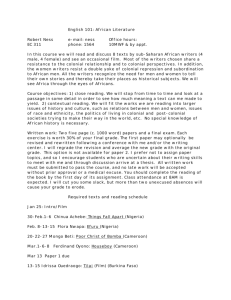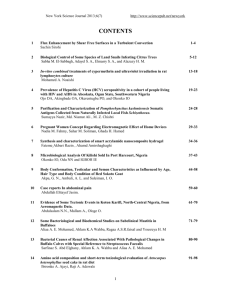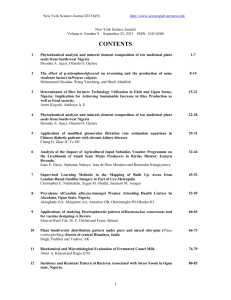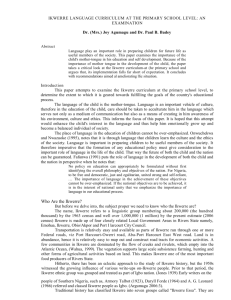Wellcome Trust History of Medicine PhD Studentship: Further
advertisement
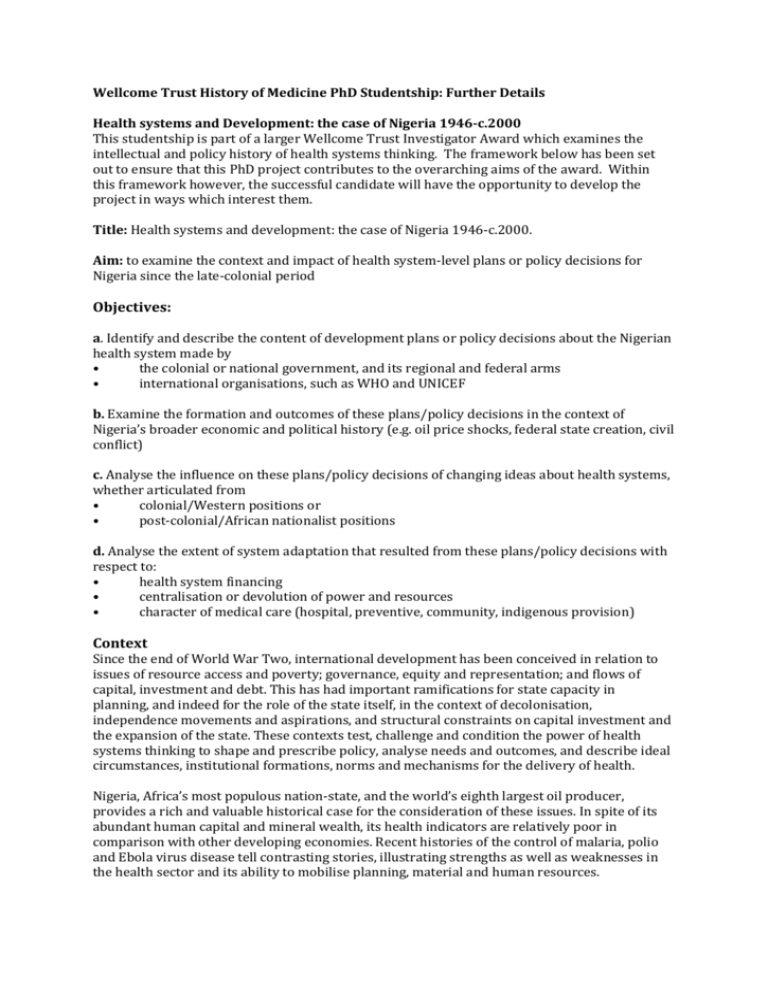
Wellcome Trust History of Medicine PhD Studentship: Further Details Health systems and Development: the case of Nigeria 1946-c.2000 This studentship is part of a larger Wellcome Trust Investigator Award which examines the intellectual and policy history of health systems thinking. The framework below has been set out to ensure that this PhD project contributes to the overarching aims of the award. Within this framework however, the successful candidate will have the opportunity to develop the project in ways which interest them. Title: Health systems and development: the case of Nigeria 1946-c.2000. Aim: to examine the context and impact of health system-level plans or policy decisions for Nigeria since the late-colonial period Objectives: a. Identify and describe the content of development plans or policy decisions about the Nigerian health system made by • the colonial or national government, and its regional and federal arms • international organisations, such as WHO and UNICEF b. Examine the formation and outcomes of these plans/policy decisions in the context of Nigeria’s broader economic and political history (e.g. oil price shocks, federal state creation, civil conflict) c. Analyse the influence on these plans/policy decisions of changing ideas about health systems, whether articulated from • colonial/Western positions or • post-colonial/African nationalist positions d. Analyse the extent of system adaptation that resulted from these plans/policy decisions with respect to: • health system financing • centralisation or devolution of power and resources • character of medical care (hospital, preventive, community, indigenous provision) Context Since the end of World War Two, international development has been conceived in relation to issues of resource access and poverty; governance, equity and representation; and flows of capital, investment and debt. This has had important ramifications for state capacity in planning, and indeed for the role of the state itself, in the context of decolonisation, independence movements and aspirations, and structural constraints on capital investment and the expansion of the state. These contexts test, challenge and condition the power of health systems thinking to shape and prescribe policy, analyse needs and outcomes, and describe ideal circumstances, institutional formations, norms and mechanisms for the delivery of health. Nigeria, Africa’s most populous nation-state, and the world’s eighth largest oil producer, provides a rich and valuable historical case for the consideration of these issues. In spite of its abundant human capital and mineral wealth, its health indicators are relatively poor in comparison with other developing economies. Recent histories of the control of malaria, polio and Ebola virus disease tell contrasting stories, illustrating strengths as well as weaknesses in the health sector and its ability to mobilise planning, material and human resources. This project interrogates the historical roots of state policy on health care provision in Nigeria, paying attention to both its dynamic potential and its systemic weakness, thereby constructing a case which illuminates the development of health systems thinking and policy in a global perspective. Programme Nigeria has had a large and highly differentiated civil service since the 1940s. Welfare and health planning has been subject to a variety of centralising and regionalising tendencies, relating to the much vaunted ‘federal character’ of the post-colonial state, an inheritance of colonial patterns of spatial, social, and ethnic differentiation. A highly developed tertiary education sector has fed into professionalised civil and military bureaucracies, to a critical and vociferous press, and to an established scholarly critical literature on health and welfare planning. Consequently, the framing, critique and documentation of state planning has been extensive. The post-colonial history of Nigeria has also been subject to repeated political shocks and extensive disruption. This has had a strong impact on state capacity in health care and health planning. Furthermore, pressures of reorganisation, of patronage and competition, and of conflict and destruction, have all shaped the outcomes of planning processes, and of their documentation. The studentship holder will be expected to identify and critically evaluate relevant Nigerian and comparative scholarly literature in the humanities and social sciences, trace published and archival documentation through a variety of state, ministerial, university and non-governmental repositories, and to complement this process of scholarly critique and information retrieval with oral historical testimony from key informants. Support and supervision will be available to assist in framing and executing this work programme.





